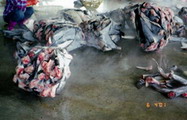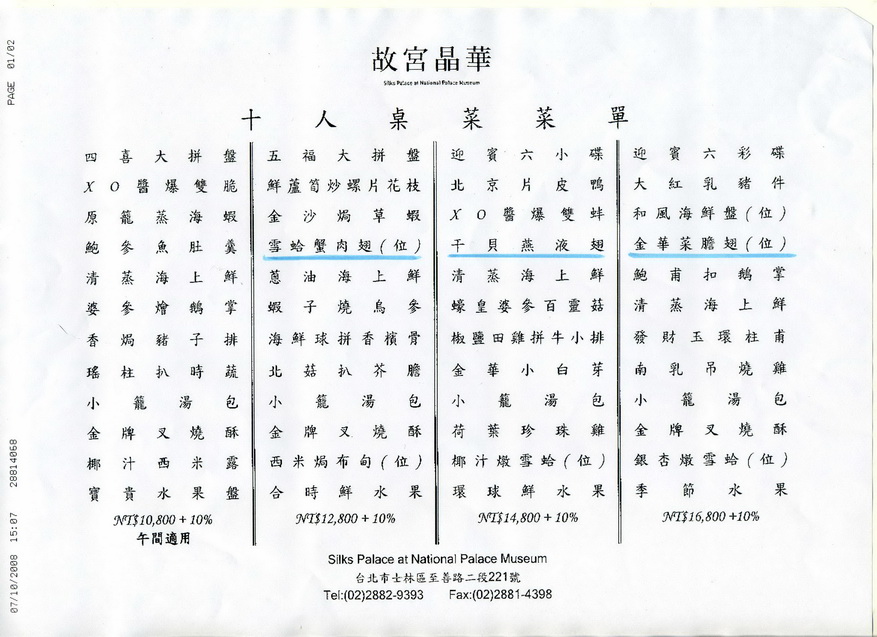 我們呼籲故宮博物院協助保護海洋生態、減少動物虐待、提昇動物福利。請立即停止所屬「故宮晶華」餐廳「故宮國寶宴」中之各種魚翅料理,說明如下:
我們呼籲故宮博物院協助保護海洋生態、減少動物虐待、提昇動物福利。請立即停止所屬「故宮晶華」餐廳「故宮國寶宴」中之各種魚翅料理,說明如下:
一、魚翅貿易不斷上升,鯊魚數量急劇下降。而魚翅向為華人酒宴上,彰顯個人身份與地位的菜餚,「沒有魚翅不成席」──近年來迭遭國內外保育團體抨擊。但根據報導,故宮博物院所屬「故宮晶華」餐廳於今(97)年6月25日之「故宮國寶宴」開幕式中,卻為了將故宮特色與食品結合,推出以古董為食器,以各種魚翅為食材之料理。事實上,魚翅不僅無法為菜餚增加多少營養價值,反而會添加顧客不願看到的成份;汞。實驗發現,魚翅含汞量遠遠超過攝食安全量。
二、根據聯合國糧食暨農業組織(FAO)保守估計,人類2003年捕殺的鯊魚及其近親物種,便達85萬6千噸,是50年前的3倍之多。而英美科學家(2006)根據香港魚翅貿易數據,推算出全球每年平均宰殺3800萬條鯊魚,共重170萬噸,較FAO統計的數字多出數倍。再根據交易資料分析,每年至少有4千萬到7千萬頭鯊魚的魚鰭被使用在魚翅湯中。
三、海洋生物學家表示,為了一嚐魚翅付出的代價,使全球各大洋最古老的生物之一正在消失,讓已經過度撈捕的海洋生態系統更岌岌可危。過去十五年間,某些鯊魚如槌頭鯊、大白鯊,數目已經銳減七成,許多鯊種在加勒比海甚至消失無蹤。根據世界自然保育聯盟(WCU)有關鯊魚族群量的研究,共有111種鯊魚的生存出現危機。其中20種受到嚴重威脅,25種瀕臨滅絕,另外66種生機脆弱。
四、 卵胎生的鯊魚每次繁殖胎期甚久、胎數甚少,幼體需經過很長時間才能成年;而且它們在海洋食物鏈中位居最高層,一旦其族群崩解,同一海洋生態系其他魚類的多樣性就會受到嚴重威脅。北大西洋沿岸漁業研究顯示,鯊魚族群的減少,造成以扇貝為攝食對象的魟魚大量增加,迫使有百年歷史的扇貝漁業走入歷史。
 五、所謂魚翅,係指鯊魚之背鰭、兩邊側鰭與尾鰭等4片「翅膀」,其重量佔不到全部魚身的1/10。由於價格昂貴,業者每次出海捕魚10多天,甚至更久,為了把船隻有限的空間提供裝載魚翅,每次捕獲的鯊魚,在取下魚翅後,就會將較無價值的魚身丟回海中,讓其在海裡慢慢流血、痛苦的死亡。
五、所謂魚翅,係指鯊魚之背鰭、兩邊側鰭與尾鰭等4片「翅膀」,其重量佔不到全部魚身的1/10。由於價格昂貴,業者每次出海捕魚10多天,甚至更久,為了把船隻有限的空間提供裝載魚翅,每次捕獲的鯊魚,在取下魚翅後,就會將較無價值的魚身丟回海中,讓其在海裡慢慢流血、痛苦的死亡。
六、根據報導,為了保護鯊魚,馬來西亞自然資源環境部已經將魚翅羹從官方的宴會菜單中除名。部長艾茲米表示:「透過避免使用魚翅羹,希望本部能對當前保育鯊魚的努力,多少作出一些貢獻。」艾茲米說:「鯊魚若滅絕,將啟動骨牌效應,而此效應的每一階段都將造成其他魚類與海洋物種滅絕或過剩,進而造成海洋生態系統失衡。」
七、故宮博物院掌管全國歷史文物之收藏與展示,在思想潮流、事物發展承先啟後的脈絡中,對海洋生態保育與動物福利理應更具敏銳度。請立即停止所屬「故宮晶華」餐廳「故宮國寶宴」中之各種魚翅料理。
Humane Society International (HSI) and EAST are writing to ask for your help in preserving marine ecosystems and reducing cruelty to animals. Specifically, we are asking you to immediately and permanently remove any products containing shark fin from your restaurant menu. In addition, we ask you to adopt and implement a written policy of never serving products containing shark fin at your restaurant.
As you are aware, in Chinese tradition, shark fin soup is considered to be an essential dish during banquets to express the host's status. It is said that "there is almost no luxury banquet without shark fin soup." However, this custom has been heavily criticized by both domestic and foreign environmental and animal protection groups.
Shark fins add almost no nutritional value to dishes, but they may add an ingredient your diners don't want: mercury. Laboratory tests have uncovered levels of mercury in shark fins that far exceed recommended safe levels.
It is estimated that tens of millions of sharks are finned every year to meet the demand created by shark fin soup. In 2006, a study of the Hong Kong shark fin trade estimated that an average of 38 million sharks, weighing a total of 1.7 million tons, are killed every year. A separate analysis of the trade found that as many as 40 million to 70 million sharks are finned each year for shark fin soup.
Because shark fins are far more valuable than any other part of the shark body, and because there is limited space in freezers on commercial fishing boats, millions of sharks have their fins cut off while still alive and are then thrown back into the water, enduring a painful death from suffocation, blood loss or predation by other species. This cruel and wasteful practice has contributed greatly to the decline of most large shark species during the past half-century.
A study of shark populations by the World Conservation Union has concluded that 111 species are under serious threat, with 20 classified as critically endangered, 25 classified as endangered and 66 classified as vulnerable. Sharks are particularly susceptible to decline because they are animals that mature slowly, have long gestation periods, and produce relatively few young. A collapse in shark populations, as with other predators, could have devastating consequences for many other fish species in the ecosystems sharks inhabit. Research in the coastal Northwest Atlantic shows that the removal of predatory sharks resulted in an over-abundance of rays, which subsequently preyed on scallops to such an extent that a century-old scallop fishery had to close down.
A growing number of well-respected Asian establishments, such as the University of Hong Kong, Disneyland Hong Kong, the government of Malaysia, and, most recently, The Tung Wah Group of Hospitals, Hong Kong's oldest and largest charitable organization, no longer serve shark fin soup. When the daughter of former President Chen Shui-bian of Taiwan was married, President Chen announced that shark fin soup
would not be served at his daughter's wedding.
National Palace Museum is a world-class museum that is in charge of the nation's treasures and priceless artworks. It is a highly respected and high profile symbol of Taiwan on the international stage. As such, the Museum is in a position to set an example, both at home and abroad, by demonstrating its commitment to protecting our marine ecosystems and animal welfare.
HSI and EAST ask you to join this trend by ensuring that your restaurant no longer serves any dish in which shark fin is an ingredient.





